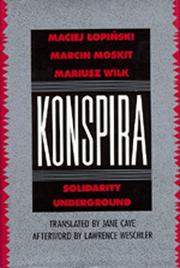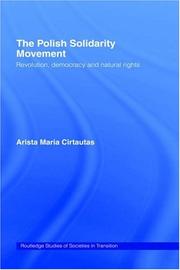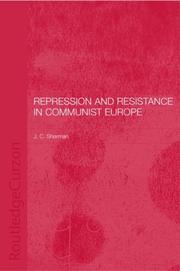| Listing 1 - 10 of 25 | << page >> |
Sort by
|
Book
ISBN: 1108565239 1108568521 1108478522 9781108565233 9781108478526 1108665497 9781108460491 Year: 2021 Publisher: Cambridge, United Kingdom ; New York, NY Cambridge University Press
Abstract | Keywords | Export | Availability | Bookmark
 Loading...
Loading...Choose an application
- Reference Manager
- EndNote
- RefWorks (Direct export to RefWorks)
In the historiography of human rights, the 1980s feature as little more than an afterthought to the human rights breakthrough of the previous decade. Through an examination of one of the major actors of recent human rights history - Poland's Solidarity movement - Robert Brier challenges this view. Suppressed in 1981, Poland's Solidarity movement was supported by a surprisingly diverse array of international groups: US Cold Warriors, French left-wing intellectuals, trade unionists, Amnesty International, even Chilean opponents of the Pinochet regime. By unpacking the politics and transnational discourses of these groups, Brier demonstrates how precarious the position of human rights in international politics remained well into the 1980s. More importantly, he shows that human rights were a profoundly political and highly contested language, which actors in East and West adopted to redefine their social and political identities in times of momentous cultural and intellectual change.
Human rights --- History --- NSZZ "Solidarność" (Labor organization) --- Solidarité (Labor organization) --- Solidarität (Labor organization) --- Solidarność (Labor organization) --- Niezależny Samorządny Związek Zawodowy "Solidarność" --- Solidarity (Labor organization) --- Solidarnostʹ (Labor organization) --- Solidaridad (Labor organization) --- Solidariedade (Labor organization) --- Solidarita (Labor organization) --- Irgun "Solidariyut" (Poland) --- Solidariyut (Labor organization) --- Gewerkschaft Solidarność --- אירגון סולידריות --- Solidaritatea (Labor organization) --- Droits de l'homme (Droit international) --- Histoire
Book
ISBN: 0807114464 Year: 1988 Publisher: Baton Rouge Louisiana State university press
Abstract | Keywords | Export | Availability | Bookmark
 Loading...
Loading...Choose an application
- Reference Manager
- EndNote
- RefWorks (Direct export to RefWorks)
Rensenbrink, John --- Journeys --- NSZZ "Solidarnosc (Labor organization) --- Poland --- Pologne --- Politics and government --- Politique et gouvernement --- 308 <438> --- 32 <438> --- 943.8.09 --- -308 <438> --- -Rensenbrink, John --- NSZZ "Solidarność (Labor organization) --- Travel --- Solidarité (Labor organization) --- Solidarität (Labor organization) --- Solidarność (Labor organization) --- Niezależny Samorządny Związek Zawodowy "Solidarność" --- Solidarity (Labor organization) --- Solidarnostʹ (Labor organization) --- Solidaridad (Labor organization) --- Solidariedade (Labor organization) --- Solidarita (Labor organization) --- Irgun "Solidariyut" (Poland) --- Solidariyut (Labor organization) --- Gewerkschaft Solidarność --- אירגון סולידריות --- Solidaritatea (Labor organization)

ISBN: 0520061314 0585079005 Year: 1990 Volume: 3 Publisher: Berkeley : University of California Press,
Abstract | Keywords | Export | Availability | Bookmark
 Loading...
Loading...Choose an application
- Reference Manager
- EndNote
- RefWorks (Direct export to RefWorks)
Conspiracies --- Dissenters --- Regions & Countries - Europe --- History & Archaeology --- Eastern Europe --- NSZZ "Solidarność" (Labor organization) --- Poland --- Politics and government --- Dissidents --- Nonconformists --- Rebels (Social psychology) --- Solidarité (Labor organization) --- Solidarität (Labor organization) --- Solidarność (Labor organization) --- Niezależny Samorządny Związek Zawodowy "Solidarność" --- Solidarity (Labor organization) --- Solidarnostʹ (Labor organization) --- Solidaridad (Labor organization) --- Solidariedade (Labor organization) --- Solidarita (Labor organization) --- Irgun "Solidariyut" (Poland) --- Solidariyut (Labor organization) --- Gewerkschaft Solidarność --- אירגון סולידריות --- Solidaritatea (Labor organization) --- Conformity --- History --- Political crimes and offenses

ISBN: 1134740433 1280318694 0203448200 9780203448205 9780415169400 0415169402 0415169402 9781280318696 9781134740437 9786610318698 6610318697 9781134740383 9781134740420 1134740425 Year: 1997 Publisher: London New York Routledge
Abstract | Keywords | Export | Availability | Bookmark
 Loading...
Loading...Choose an application
- Reference Manager
- EndNote
- RefWorks (Direct export to RefWorks)
This book provides a groundbreaking analysis of democratization in Poland by placing Solidarity in the context of the major democratic upheavals of modernity; the French and American Revolutions.
Civil rights --- Natural law. --- Democracy --- Law of nature (Law) --- Natural rights --- Nature, Law of (Law) --- Rights, Natural --- Law --- NSZZ "Solidarność" (Labor organization) --- Solidarité (Labor organization) --- Solidarität (Labor organization) --- Solidarność (Labor organization) --- Niezależny Samorządny Związek Zawodowy "Solidarność" --- Solidarity (Labor organization) --- Solidarnostʹ (Labor organization) --- Solidaridad (Labor organization) --- Solidariedade (Labor organization) --- Solidarita (Labor organization) --- Irgun "Solidariyut" (Poland) --- Solidariyut (Labor organization) --- Gewerkschaft Solidarność --- אירגון סולידריות --- Solidaritatea (Labor organization) --- Poland --- Politics and government --- NSZZ "Solidarnosc" (Labor organization)

ISBN: 1134400446 1280073225 0203438906 9780203438909 9786610073221 6610073228 9780415306690 0415306698 0415306698 9781134400447 9781134400393 113440039X 9781134400430 1134400438 Year: 2003 Publisher: London New York RoutledgeCurzon
Abstract | Keywords | Export | Availability | Bookmark
 Loading...
Loading...Choose an application
- Reference Manager
- EndNote
- RefWorks (Direct export to RefWorks)
This book explores the role of coercion in the relationship between the citizens and regimes of communist Eastern Europe.
Communism --- History. --- NSZZ "Solidarność" (Labor organization) --- Solidarité (Labor organization) --- Solidarität (Labor organization) --- Solidarność (Labor organization) --- Niezależny Samorządny Związek Zawodowy "Solidarność" --- Solidarity (Labor organization) --- Solidarnostʹ (Labor organization) --- Solidaridad (Labor organization) --- Solidariedade (Labor organization) --- Solidarita (Labor organization) --- Irgun "Solidariyut" (Poland) --- Solidariyut (Labor organization) --- Gewerkschaft Solidarność --- אירגון סולידריות --- Solidaritatea (Labor organization) --- Europe, Eastern --- Hungary --- Poland --- Politics and government --- History --- NSZZ "Solidarnosc" (Labor organization)
Book
ISBN: 0691078629 1306986184 0691606897 1400861551 0691635587 Year: 1991 Publisher: Princeton, New Jersey : Princeton University Press,
Abstract | Keywords | Export | Availability | Bookmark
 Loading...
Loading...Choose an application
- Reference Manager
- EndNote
- RefWorks (Direct export to RefWorks)
In July 1980, two weeks before the Gdansk shipyard strikes, Roman Laba arrived in Poland as an American graduate student. He stayed there for almost two and a half years before he was arrested and expelled from the country for "activities noxious to the interests of the Polish state." Laba had set himself the ambitious task of documenting the history of Poland's free trade union. Martial law was in force for the last year of his stay, but even during that time he continued his rescue of the unique historical materials that contribute so much to Roots of Solidarity. The book uses this hard-earned information to challenge the commonly accepted view of the Polish intelligentsia as the driving force behind Solidarity and to demonstrate that the roots of the movement go back a decade earlier than the 1980 strikes. Laba presents compelling evidence that Solidarity emerged directly from the activities of workers in the 1970s along the Baltic coast. It was not the intellectual elite but these workers, independent of and unknown to the rest of Poland, who created three crucial strategies for struggle against oppression: the sit-down strike, the interfactory strike committee, and the demand for free trade unions independent of the party state. This concise and provocative work is divided into two parts. The first is a narrative of the creation of Solidarity. The second shows how workers' resistance to the Leninist state gradually generated new forms of democratic organizations and politics. Laba criticizes elitist ways of understanding social movements and also presents an unusual analysis of Solidarity's ritual symbolism. In addition, new evidence transforms our understanding of the role of the police and the army in a one-party state.Originally published in 1991.The Princeton Legacy Library uses the latest print-on-demand technology to again make available previously out-of-print books from the distinguished backlist of Princeton University Press. These editions preserve the original texts of these important books while presenting them in durable paperback and hardcover editions. The goal of the Princeton Legacy Library is to vastly increase access to the rich scholarly heritage found in the thousands of books published by Princeton University Press since its founding in 1905.
Political sociology --- Social classes --- Labor unions --- Working class --- Sociologie politique --- Classes sociales --- Syndicats --- Travailleurs --- Political activity --- Activité politique --- NSZZ "Solidarnosc" (Labor organization) --- Poland --- Pologne --- Politics and government --- Politique et gouvernement --- Activité politique --- NSZZ "Solidarność" (Labor organization) --- Political sociology. --- Democratization --- Commons (Social order) --- Labor and laboring classes --- Laboring class --- Labouring class --- Working classes --- Labor --- Democratic consolidation --- Democratic transition --- Political science --- New democracies --- Employment --- Solidarité (Labor organization) --- Solidarität (Labor organization) --- Solidarność (Labor organization) --- Niezależny Samorządny Związek Zawodowy "Solidarność" --- Solidarity (Labor organization) --- Solidarnostʹ (Labor organization) --- Solidaridad (Labor organization) --- Solidariedade (Labor organization) --- Solidarita (Labor organization) --- Irgun "Solidariyut" (Poland) --- Solidariyut (Labor organization) --- Gewerkschaft Solidarność --- אירגון סולידריות --- Solidaritatea (Labor organization)
Book
ISBN: 2707112887 9782707112880 Year: 1982 Publisher: Paris Maspero
Abstract | Keywords | Export | Availability | Bookmark
 Loading...
Loading...Choose an application
- Reference Manager
- EndNote
- RefWorks (Direct export to RefWorks)
Gdansk --- --Pologne --- --Témoignage --- --1970-1980 --- --NSZZ "Solidarność" (Labor organization) --- Gdańsk (Poland) --- History --- 331.105.44 <438> --- 323.26 <438> '1970/1980" --- 323.26 --- Actieve politieke strijdmethoden --- Gdansk (Poland) --- -History --- 323.26 Actieve politieke strijdmethoden --- NSZZ "Solidarność" (Labor organization). --- Solidarité (Labor organization) --- Solidarität (Labor organization) --- Solidarność (Labor organization) --- Niezależny Samorządny Związek Zawodowy "Solidarność" --- Solidarity (Labor organization) --- Solidarnostʹ (Labor organization) --- Solidaridad (Labor organization) --- Solidariedade (Labor organization) --- Solidarita (Labor organization) --- Irgun "Solidariyut" (Poland) --- Solidariyut (Labor organization) --- Gewerkschaft Solidarność --- אירגון סולידריות --- Solidaritatea (Labor organization) --- History. --- Témoignage --- Pologne --- Gdańsk (Poland) - History
Book
ISBN: 1283599511 9786613911964 0739150723 0739150707 0739150715 9780739150726 9780739150702 9781283599511 6613911968 Year: 2010 Publisher: Lanham, Md. : Lexington Books,
Abstract | Keywords | Export | Availability | Bookmark
 Loading...
Loading...Choose an application
- Reference Manager
- EndNote
- RefWorks (Direct export to RefWorks)
The Polish crisis in the early 1980's provoked a great deal of reaction in the West. Not only governments, but social movements were also touched by the changes. This book analyzes Western European social reaction to the Independent Self-governing Trade Union Solidarnosc, Revealing how many unionists hesitated between détente and workers' rights, between Atlantic cold warriors and European cooperation. It provides new insights relevant to historians dealing with the Cold War, Labor, and European integration.
International labor activities --- Labor movement --- Labor unions --- History --- Political activity --- NSZZ "Solidarność" (Labor organization) --- History. --- Industrial unions --- Labor, Organized --- Labor organizations --- Organized labor --- Trade-unions --- Unions, Labor --- Unions, Trade --- Working-men's associations --- Labor and laboring classes --- Labor activities, International --- International cooperation --- Solidarité (Labor organization) --- Solidarität (Labor organization) --- Solidarność (Labor organization) --- Niezależny Samorządny Związek Zawodowy "Solidarność" --- Solidarity (Labor organization) --- Solidarnostʹ (Labor organization) --- Solidaridad (Labor organization) --- Solidariedade (Labor organization) --- Solidarita (Labor organization) --- Irgun "Solidariyut" (Poland) --- Solidariyut (Labor organization) --- Gewerkschaft Solidarność --- אירגון סולידריות --- Solidaritatea (Labor organization) --- Societies --- Central labor councils --- Guilds --- Syndicalism --- Social movements
Book
ISBN: 3839419220 9783839419229 9783837619225 Year: 2012 Publisher: Bielefeld [Germany]
Abstract | Keywords | Export | Availability | Bookmark
 Loading...
Loading...Choose an application
- Reference Manager
- EndNote
- RefWorks (Direct export to RefWorks)
Um Einzelne oder Gruppen nicht als politische Subjekte anzuerkennen, genügt es, ihnen jegliche Art von Äußerung im öffentlichen Raum zu versagen. Diese Strategie wurde auch in dem totalitären Herrschaftssystem verfolgt, das in Polen zu Zeiten des Kommunismus bestand. Unter dem Aspekt der Theatralität analysiert Berenika Szymanski in ihrer interdisziplinären Studie, wie dieses System mit Hilfe von öffentlichen Protestakten seitens der Gewerkschaft Solidarnosc, aber auch anderer zivilgesellschaftlicher Akteure, durchbrochen wurde. Diese Perspektive ermöglicht es, einen entscheidenden - bis dato jedoch vernachlässigten - Beitrag zum politischen Umbruch von 1989 herauszuarbeiten. »Eine informative und abwägend argumentierende Studie [...], die ein breites Spektrum der oppositionellen Gruppierungen und der von diesen benutzten theatralen Strategien in den Blick nimmt. Damit werden wichtige Akteure des politischen Umbruchs in Polen sichtbar, die in der politikwissenschaftlichen Forschung bislang keine Rolle spielten.« Katarzyna Sliwinska, sehepunkte, 15/3 (2015) »Eine informative und abwägend argumentierende Studie [...], die ein breites Spektrum der oppositionellen Gruppierungen und der von diesen benutzten theatralen Strategien in den Blick nimmt. Damit werden wichtige Akteure des politischen Umbruchs in Polen sichtbar, die in der politikwissenschaftlichen Forschung bislang keine Rolle spielten.« Katarzyna Sliwinska, Zeitschrift für Ostmitteleuropa-Forschung, 63/4 (2014) »Alles in allem ist [...] ein wichtiges Buch entstanden, das methodisches Neuland betritt und dem man eine weite Verbreitung wünschen muss.« Markus Krzoska, Neue Politische Literatur, 58 (2013) »Szymanski gelingt es überzeugend, ihr formuliertes Vorhaben umzusetzen. Die Arbeit zeigt, dass die theatralen Protestformen nicht nur Ornament des politischen Umbruchs sind. Vielmehr wird durch sie die politische Mobilisierung für einen Systemwandel erst vollzogen. Saskia Fischer, H-Soz-u-Kult, 06.09.2012 »Vor dem Hintergrund der kaum mehr zu überblickenden sozialwissenschaftlichen Forschung zu den polnischen Protestbewegungen der 1980er-Jahre stellt sich die Frage, ob [die] Analyse lediglich aus theaterwissenschaftlicher Sicht von Interesse ist oder auch für die Politikwissenschaft einen Mehrwert bietet. Und Letzteres lässt sich eindeutig konstatieren. Das Buch ist auch für viele sozialwissenschaftliche Disziplinen jenseits des engen Bereichs der Transformationsforschung sehr empfehlenswert.« Björn Wagner, Portal für Politikwissenschaft (pw-portal.de), 16.05.2012 Besprochen in: H-Soz-u-Kult, 9 (2012), Saskia Fischer
1989. --- Contemporary History. --- Cultural Studies. --- Kulturwissenschaft. --- Polen. --- Politics. --- Politik. --- Protest. --- Solidarnosc. --- Theater. --- Theaterwissenschaft. --- Theatre Studies. --- Theatre. --- Zeitgeschichte. --- Zivilgesellschaft. --- Öffentlichkeit. --- PERFORMING ARTS / Theater / History & Criticism. --- NSZZ "Solidarność" (Labor organization) --- Solidarité (Labor organization) --- Solidarität (Labor organization) --- Solidarność (Labor organization) --- Niezależny Samorządny Związek Zawodowy "Solidarność" --- Solidarity (Labor organization) --- Solidarnostʹ (Labor organization) --- Solidaridad (Labor organization) --- Solidariedade (Labor organization) --- Solidarita (Labor organization) --- Irgun "Solidariyut" (Poland) --- Solidariyut (Labor organization) --- Gewerkschaft Solidarność --- אירגון סולידריות --- Solidaritatea (Labor organization) --- Poland --- History --- Theatralität; Polen; Solidarnosc; Protest; 1989; Öffentlichkeit; Zivilgesellschaft; Theater; Politik; Theaterwissenschaft; Zeitgeschichte; Kulturwissenschaft; Civil Society; Theatre; Politics; Theatre Studies; Contemporary History; Cultural Studies
Book
ISBN: 9780739150702 Year: 2010 Volume: *2 Publisher: Lanham [etc.] Lexington Books
Abstract | Keywords | Export | Availability | Bookmark
 Loading...
Loading...Choose an application
- Reference Manager
- EndNote
- RefWorks (Direct export to RefWorks)
Academic collection --- C5 --- vakbonden --- vakbeweging --- West-Europa (x) --- Polska [land - PL] --- Maatschappelijke organisaties en maatschappelijk leven --- International labor activities --- Labor movement --- Labor unions --- Industrial unions --- Labor, Organized --- Labor organizations --- Organized labor --- Trade-unions --- Unions, Labor --- Unions, Trade --- Working-men's associations --- Societies --- Central labor councils --- Guilds --- Syndicalism --- Labor and laboring classes --- Social movements --- Labor activities, International --- History --- Political activity --- International cooperation --- NSZZ "Solidarność" (Labor organization) --- Solidarité (Labor organization) --- Solidarität (Labor organization) --- Solidarność (Labor organization) --- Niezależny Samorządny Związek Zawodowy "Solidarność" --- Solidarity (Labor organization) --- Solidarnostʹ (Labor organization) --- Solidaridad (Labor organization) --- Solidariedade (Labor organization) --- Solidarita (Labor organization) --- Irgun "Solidariyut" (Poland) --- Solidariyut (Labor organization) --- Gewerkschaft Solidarność --- אירגון סולידריות --- Solidaritatea (Labor organization) --- History.
| Listing 1 - 10 of 25 | << page >> |
Sort by
|

 Search
Search Feedback
Feedback About UniCat
About UniCat  Help
Help News
News